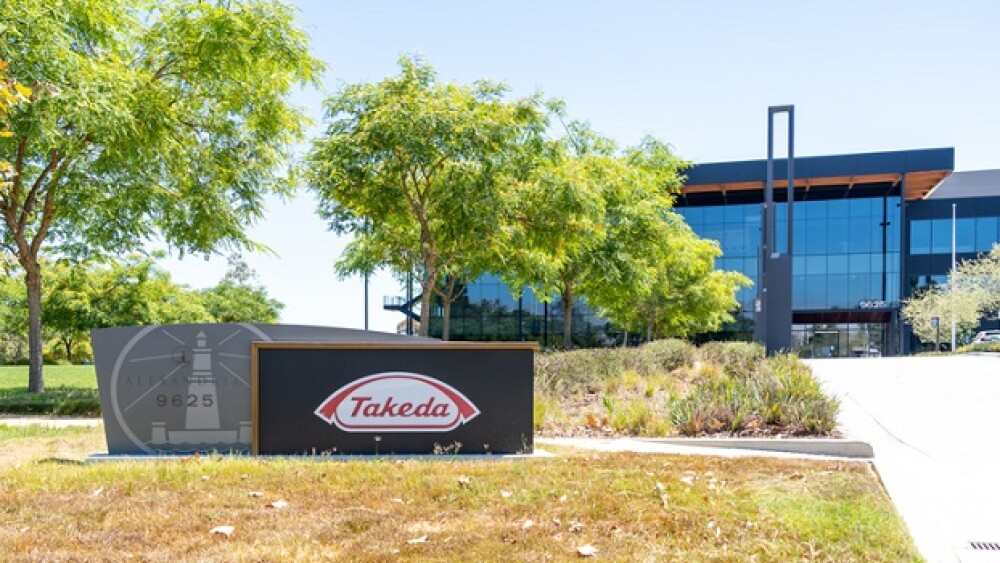Takeda on Tuesday secured another label expansion for the kinase inhibitor, this time in the first-line setting for the treatment of Philadelphia chromosome-positive acute lymphoblastic leukemia.
Pictured: Takeda’s signage outside its office in California/iStock, JHVEPhoto
The FDA on Tuesday expanded the label of Takeda’s Iclusig (ponatinib). The kinase inhibitor can now be used with chemotherapy to treat adult patients with Philadelphia chromosome-positive acute lymphoblastic leukemia in the first-line setting.
The label expansion was granted under the FDA’s accelerated pathway based on Iclusig’s ability to induce minimal residual disease (MRD)-negative complete remission (CR). Takeda will need to run confirmatory studies to verify the clinical benefit of Iclusig in this indication to ensure continued approval.
Awny Farajallah, CMO of oncology at Takeda, in a statement called Tuesday’s label expansion an “incredibly exciting milestone” as it will provide newly diagnosed Philadelphia chromosome-positive acute lymphoblastic leukemia (Ph+ ALL) patients with “an approved, targeted treatment option in the frontline.”
Affecting around 25% of adult ALL patients in the U.S., Ph+ ALL is a rare and aggressive form of leukemia that can be traced back the presence of the abnormal Philadelphia chromosome, which forms when specific parts of chromosomes 9 and 22 switch with each other. This type of mutation creates a fusion protein called BCR-ABL1, a tyrosine kinase that makes cancer cells grow and divide uncontrollably.
Iclusig, an orally available kinase inhibitor, addresses Ph+ ALL by targeting the BCR-ABL1 fusion gene product. It also targets all BCR-ABL1 treatment-resistant mutations. The drug was first granted accelerated approval in 2012 for the treatment of chronic myeloid leukemia and Ph+ ALL resistant to prior tyrosine kinase inhibitor therapies. The FDA granted Iclusig full approval for these indications in 2016.
At the time, Iclusig was still owned by Ariad Pharmaceuticals, its original developer. Takeda acquired Ariad in January 2017 for $5.2 billion.
The FDA’s approval on Tuesday is backed by data from the Phase III PhALLCON trial, a registrational and head-to-head study comparing Iclusig against Novartis’ Gleevec (imatinib) for the treatment of adults with newly diagnosed Ph+ ALL. All patients also received reduced-intensity chemotherapy.
At the end of treatment induction, PhALLCON met its primary endpoint of MRD-negative CR, which is a composite outcome that reflects deep molecular and clinical response, according to Takeda’s announcememnt on Tuesday. MRD-negative CR is also an “important prognostic indicator for long-term outcomes” in Ph+ ALL.
After three cycles, Iclusig was able to elicit more than a twofold improvement in MRD-negative CR as compared with Gleevec. Takeda’s kinase inhibitor was also as safe as Gleevec, with no new signals of concern detected.
Iclusig’s label comes with a boxed warning for arterial occlusive events, venous thromboembolic events, heart failure and hepatotoxicity. Patients should be monitored for these complications and treatment should be interrupted or discontinued based on severity, according to the boxed warning.
Tristan Manalac is an independent science writer based in Metro Manila, Philippines. Reach out to him on LinkedIn or email him at tristan@tristanmanalac.com or tristan.manalac@biospace.com.






